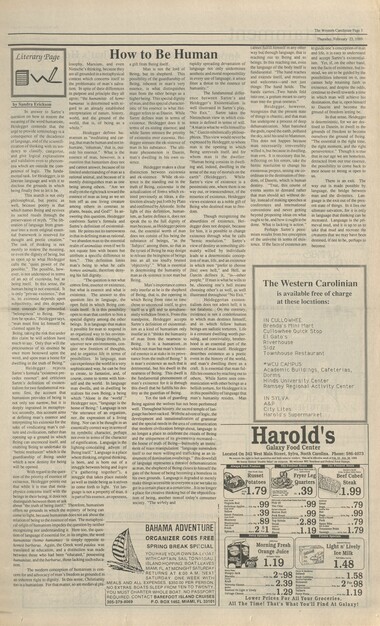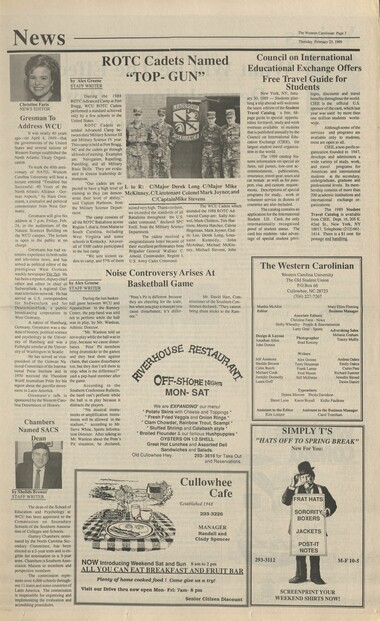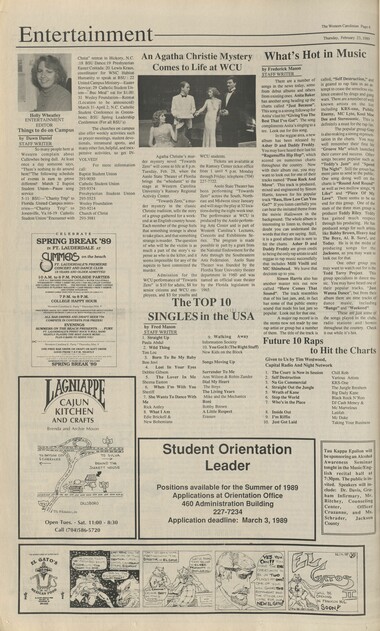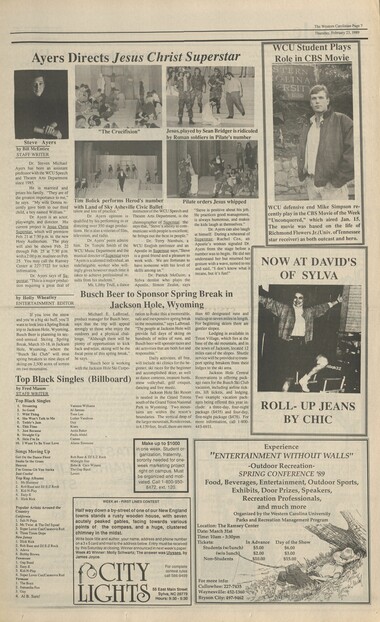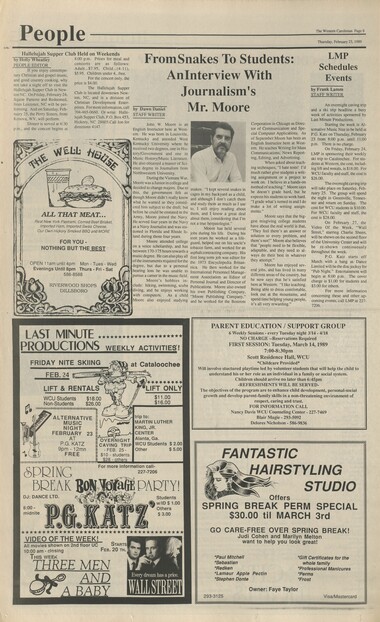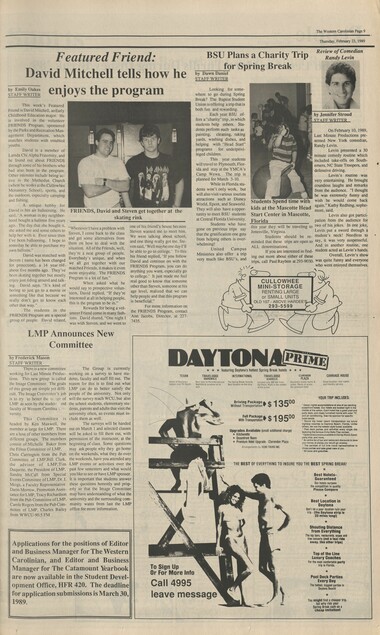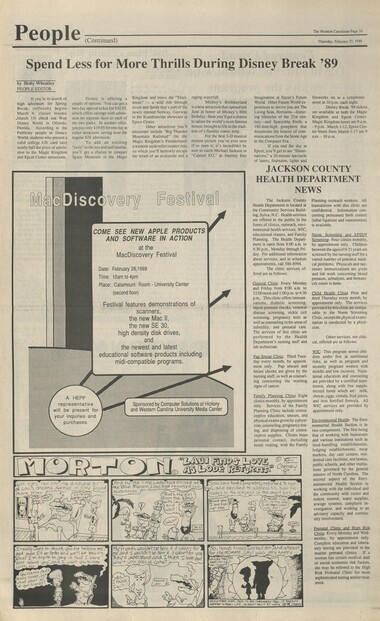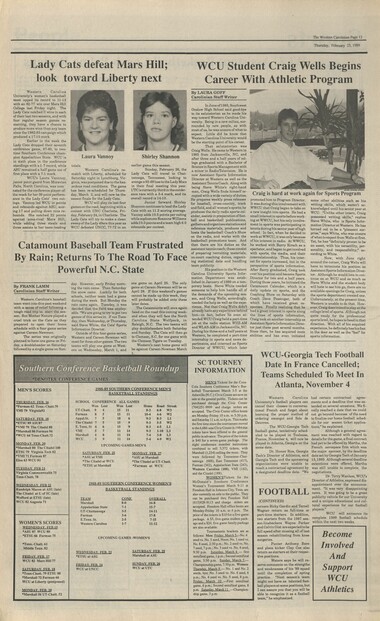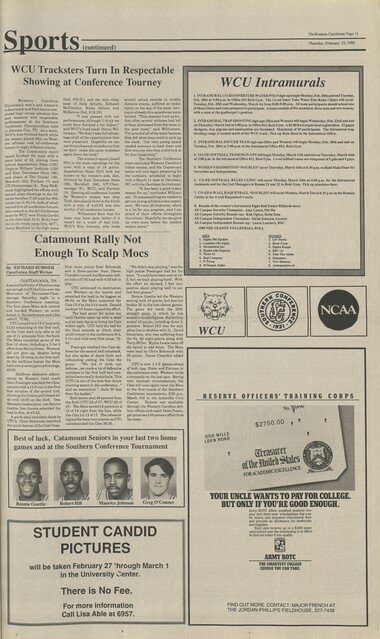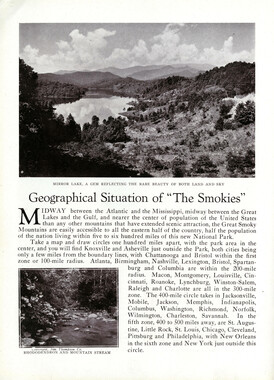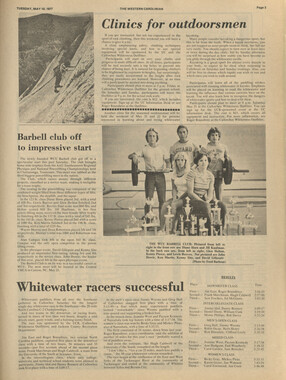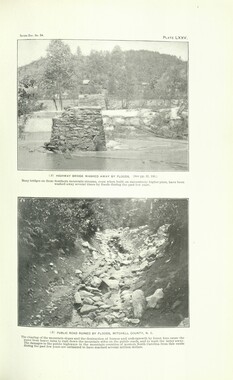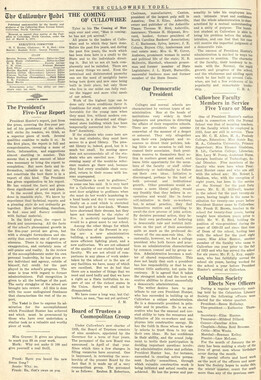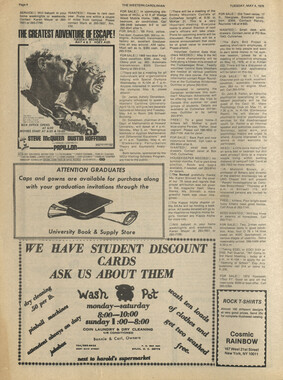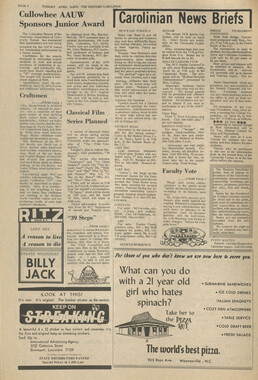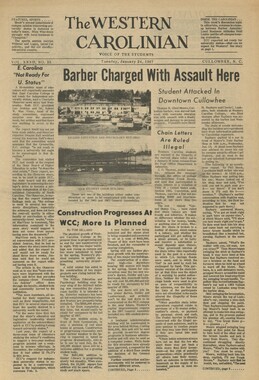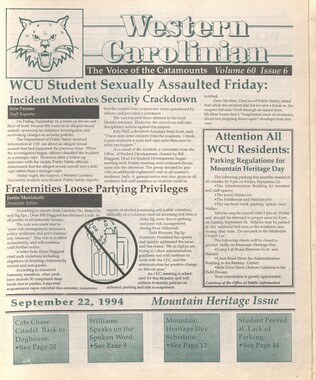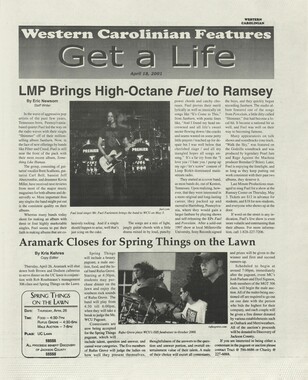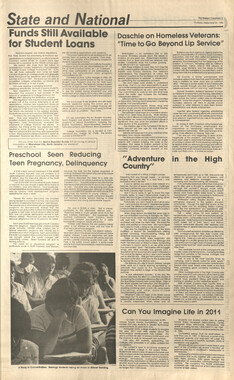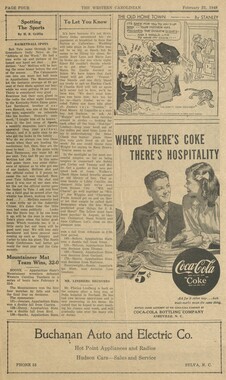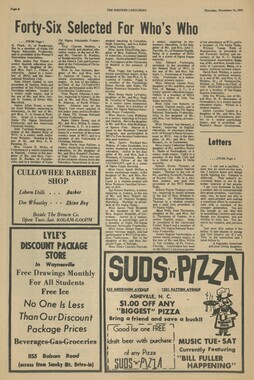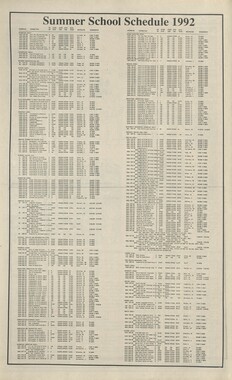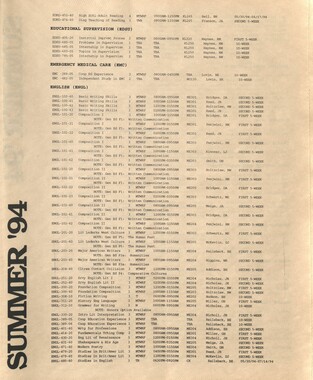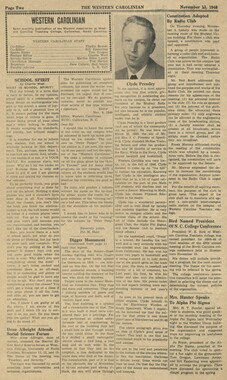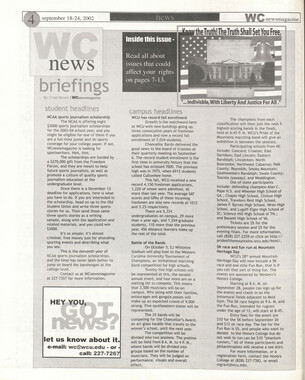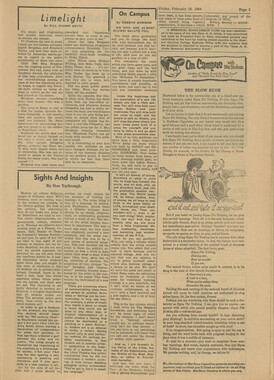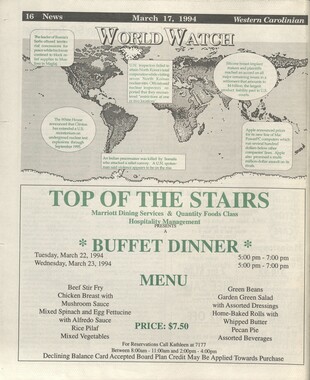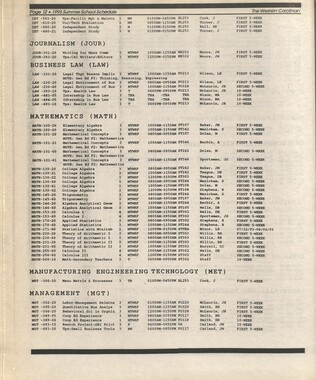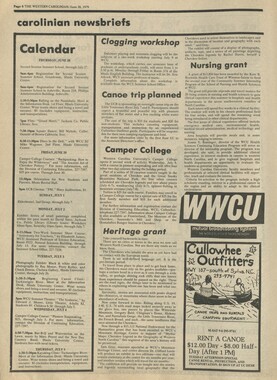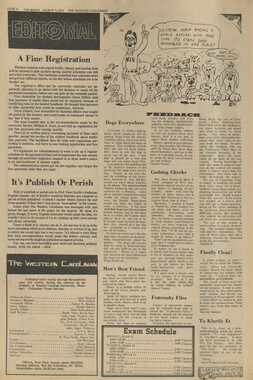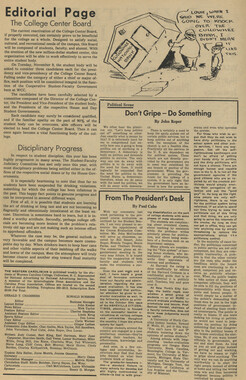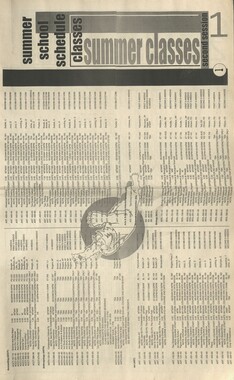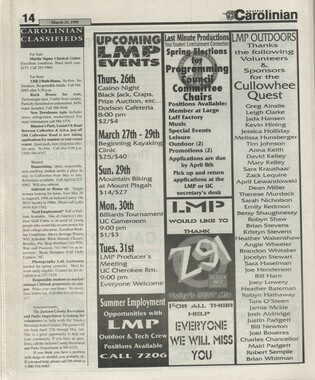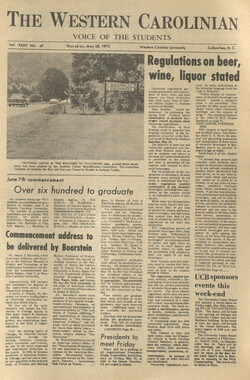Western Carolina University (20)
View all
- Canton Champion Fibre Company (2308)
- Cherokee Traditions (292)
- Civil War in Southern Appalachia (165)
- Craft Revival (1942)
- Great Smoky Mountains - A Park for America (2766)
- Highlights from Western Carolina University (430)
- Horace Kephart (941)
- Journeys Through Jackson (154)
- LGBTQIA+ Archive of Jackson County (85)
- Oral Histories of Western North Carolina (314)
- Picturing Appalachia (6772)
- Stories of Mountain Folk (413)
- Travel Western North Carolina (160)
- Western Carolina University Fine Art Museum Vitreograph Collection (129)
- Western Carolina University Herbarium (92)
- Western Carolina University: Making Memories (708)
- Western Carolina University Publications (2283)
- Western Carolina University Restricted Electronic Theses and Dissertations (146)
- Western North Carolina Regional Maps (71)
- World War II in Southern Appalachia (131)
University of North Carolina Asheville (6)
View all
- Allanstand Cottage Industries (62)
- Appalachian National Park Association (53)
- Bennett, Kelly, 1890-1974 (1388)
- Berry, Walter (76)
- Brasstown Carvers (40)
- Carver, George Washington, 1864?-1943 (26)
- Cathey, Joseph, 1803-1874 (1)
- Champion Fibre Company (233)
- Champion Paper and Fibre Company (297)
- Cherokee Indian Fair Association (16)
- Cherokee Language Program (22)
- Crowe, Amanda (40)
- Edmonston, Thomas Benton, 1842-1907 (7)
- Ensley, A. L. (Abraham Lincoln), 1865-1948 (275)
- Fromer, Irving Rhodes, 1913-1994 (70)
- George Butz (BFS 1907) (46)
- Goodrich, Frances Louisa (120)
- Grant, George Alexander, 1891-1964 (96)
- Heard, Marian Gladys (60)
- Kephart, Calvin, 1883-1969 (15)
- Kephart, Horace, 1862-1931 (313)
- Kephart, Laura, 1862-1954 (39)
- Laney, Gideon Thomas, 1889-1976 (439)
- Masa, George, 1881-1933 (61)
- McElhinney, William Julian, 1896-1953 (44)
- Niggli, Josephina, 1910-1983 (10)
- North Carolina Park Commission (105)
- Osborne, Kezia Stradley (9)
- Owens, Samuel Robert, 1918-1995 (11)
- Penland Weavers and Potters (36)
- Roberts, Vivienne (15)
- Roth, Albert, 1890-1974 (142)
- Schenck, Carl Alwin, 1868-1955 (1)
- Sherrill's Photography Studio (2565)
- Southern Highland Handicraft Guild (127)
- Southern Highlanders, Inc. (71)
- Stalcup, Jesse Bryson (46)
- Stearns, I. K. (213)
- Thompson, James Edward, 1880-1976 (226)
- United States. Indian Arts and Crafts Board (130)
- USFS (683)
- Vance, Zebulon Baird, 1830-1894 (1)
- Weaver, Zebulon, 1872-1948 (58)
- Western Carolina College (230)
- Western Carolina Teachers College (282)
- Western Carolina University (1794)
- Western Carolina University. Mountain Heritage Center (18)
- Whitman, Walt, 1819-1892 (10)
- Wilburn, Hiram Coleman, 1880-1967 (73)
- Williams, Isadora (3)
- Cain, Doreyl Ammons (0)
- Crittenden, Lorraine (0)
- Rhodes, Judy (0)
- Smith, Edward Clark (0)
- Appalachian Region, Southern (2569)
- Asheville (N.C.) (1923)
- Avery County (N.C.) (26)
- Blount County (Tenn.) (161)
- Buncombe County (N.C.) (1672)
- Cherokee County (N.C.) (283)
- Clay County (N.C.) (555)
- Graham County (N.C.) (233)
- Great Smoky Mountains National Park (N.C. and Tenn.) (519)
- Haywood County (N.C.) (3524)
- Henderson County (N.C.) (70)
- Jackson County (N.C.) (4694)
- Knox County (Tenn.) (25)
- Knoxville (Tenn.) (12)
- Lake Santeetlah (N.C.) (10)
- Macon County (N.C.) (420)
- Madison County (N.C.) (212)
- McDowell County (N.C.) (39)
- Mitchell County (N.C.) (132)
- Polk County (N.C.) (35)
- Qualla Boundary (981)
- Rutherford County (N.C.) (76)
- Swain County (N.C.) (2115)
- Transylvania County (N.C.) (270)
- Watauga County (N.C.) (12)
- Waynesville (N.C.) (84)
- Yancey County (N.C.) (72)
- Aerial Photographs (3)
- Aerial Views (60)
- Albums (books) (4)
- Articles (1)
- Artifacts (object Genre) (228)
- Bibliographies (1)
- Biography (general Genre) (2)
- Cards (information Artifacts) (38)
- Clippings (information Artifacts) (191)
- Crafts (art Genres) (622)
- Depictions (visual Works) (21)
- Design Drawings (1)
- Drawings (visual Works) (184)
- Envelopes (73)
- Facsimiles (reproductions) (1)
- Fiction (general Genre) (4)
- Financial Records (12)
- Fliers (printed Matter) (67)
- Glass Plate Negatives (381)
- Guidebooks (2)
- Internegatives (10)
- Interviews (815)
- Land Surveys (102)
- Letters (correspondence) (1013)
- Manuscripts (documents) (618)
- Maps (documents) (177)
- Memorandums (25)
- Minutes (administrative Records) (59)
- Negatives (photographs) (5835)
- Newsletters (1285)
- Newspapers (2)
- Occupation Currency (1)
- Paintings (visual Works) (1)
- Pen And Ink Drawings (1)
- Periodicals (193)
- Personal Narratives (10)
- Photographs (12976)
- Plans (maps) (1)
- Poetry (6)
- Portraits (4533)
- Postcards (329)
- Programs (documents) (151)
- Publications (documents) (2236)
- Questionnaires (65)
- Scrapbooks (282)
- Sheet Music (2)
- Slides (photographs) (402)
- Songs (musical Compositions) (2)
- Sound Recordings (796)
- Specimens (92)
- Speeches (documents) (15)
- Tintypes (photographs) (8)
- Transcripts (322)
- Video Recordings (physical Artifacts) (23)
- Vitreographs (129)
- Text Messages (0)
- A.L. Ensley Collection (275)
- Appalachian Industrial School Records (7)
- Appalachian National Park Association Records (336)
- Axley-Meroney Collection (2)
- Bayard Wootten Photograph Collection (20)
- Bethel Rural Community Organization Collection (7)
- Blumer Collection (5)
- C.W. Slagle Collection (20)
- Canton Area Historical Museum (2110)
- Carlos C. Campbell Collection (282)
- Cataloochee History Project (64)
- Cherokee Studies Collection (4)
- Daisy Dame Photograph Album (5)
- Daniel Boone VI Collection (1)
- Doris Ulmann Photograph Collection (112)
- Elizabeth H. Lasley Collection (1)
- Elizabeth Woolworth Szold Fleharty Collection (4)
- Frank Fry Collection (95)
- George Masa Collection (173)
- Gideon Laney Collection (452)
- Hazel Scarborough Collection (2)
- Hiram C. Wilburn Papers (28)
- Historic Photographs Collection (236)
- Horace Kephart Collection (861)
- Humbard Collection (33)
- Hunter and Weaver Families Collection (1)
- I. D. Blumenthal Collection (4)
- Isadora Williams Collection (4)
- Jesse Bryson Stalcup Collection (47)
- Jim Thompson Collection (224)
- John B. Battle Collection (7)
- John C. Campbell Folk School Records (80)
- John Parris Collection (6)
- Judaculla Rock project (2)
- Kelly Bennett Collection (1407)
- Love Family Papers (11)
- Major Wiley Parris Civil War Letters (3)
- Map Collection (12)
- McFee-Misemer Civil War Letters (34)
- Mountain Heritage Center Collection (4)
- Norburn - Robertson - Thomson Families Collection (44)
- Pauline Hood Collection (7)
- Pre-Guild Collection (2)
- Qualla Arts and Crafts Mutual Collection (12)
- R.A. Romanes Collection (681)
- Rosser H. Taylor Collection (1)
- Samuel Robert Owens Collection (94)
- Sara Madison Collection (144)
- Sherrill Studio Photo Collection (2558)
- Smoky Mountains Hiking Club Collection (616)
- Stories of Mountain Folk - Radio Programs (374)
- The Reporter, Western Carolina University (510)
- Venoy and Elizabeth Reed Collection (16)
- WCU Gender and Sexuality Oral History Project (32)
- WCU Mountain Heritage Center Oral Histories (25)
- WCU Oral History Collection - Mountain People, Mountain Lives (71)
- WCU Students Newspapers Collection (1744)
- Western North Carolina Tomorrow Black Oral History Project (69)
- William Williams Stringfield Collection (2)
- Zebulon Weaver Collection (109)
- African Americans (390)
- Appalachian Trail (35)
- Artisans (521)
- Cherokee art (84)
- Cherokee artists -- North Carolina (10)
- Cherokee language (21)
- Cherokee pottery (101)
- Cherokee women (208)
- Church buildings (170)
- Civilian Conservation Corps (U.S.) (110)
- College student newspapers and periodicals (1830)
- Dams (107)
- Dance (1023)
- Education (222)
- Floods (61)
- Folk music (1015)
- Forced removal, 1813-1903 (2)
- Forest conservation (220)
- Forests and forestry (1184)
- Gender nonconformity (4)
- Great Smoky Mountains National Park (N.C. and Tenn.) (181)
- Hunting (38)
- Landscape photography (25)
- Logging (118)
- Maps (83)
- Mines and mineral resources (8)
- North Carolina -- Maps (18)
- Paper industry (38)
- Postcards (255)
- Pottery (135)
- Railroad trains (71)
- Rural electrification -- North Carolina, Western (3)
- School integration -- Southern States (2)
- Segregation -- North Carolina, Western (5)
- Slavery (5)
- Sports (452)
- Storytelling (244)
- Waterfalls -- Great Smoky Mountains (N.C. and Tenn.) (66)
- Weaving -- Appalachian Region, Southern (280)
- Wood-carving -- Appalachian Region, Southern (328)
- World War, 1939-1945 (173)
Western Carolinian Volume 54 Number 20
Item
Item’s are ‘child’ level descriptions to ‘parent’ objects, (e.g. one page of a whole book).
-
-
The Western Carolinian Page 5 How to Be Human by Sandra Erickson In answer to Sartre's question on how to restore the meaning of the word humanism, Heidegger contends that the urge to provide terminology is a consequence of the decadence of language, and of the scientifi- cization of thinking with its tendency to classify, categorize, and give logical explanations and validation even to phenomena which are outside the competence of logic. The fundamental task, for Heidegger, is to liberate language and with it to disclose the grounds in which being finally free to let it be. This search is not only philosophical, but poetic as well, because poetry is that which names Being and revives its sacred rituals through the preservation of myth. "The liberation of language from grammar into a more original essential framework is reserved for thought and poetic creation." The task of thinking is not merely to restore the meaning, or even the dignity of being, but to open up to what Heidegger calls the "quiet power of the possible." The possible, however, is not understood in terms of an act of existentia, but as being itself. In this sense, the human being is not essential. It is only "private existence," that is, its existenia depends upon subjectivity, and this dependence conceals the primordial "belonginess" to Being. "Before he speaks," Heidegger says, "man must first let himself be claimed again by Being, taking the risk that under this claim he will seldom have much to say. Only thus will the preciousness of its essence be once more bestowed upon the word, and upon man a home for dwelling in the truth of Being." Heidegger rejects Sartre's formula "existence precedes essence" and criticizes Sartre's definition of existentialism for two fundamental reasons: first, the account that humanism provides of being is not only too narrow, but it is deeply ingrained in metaphysics; secondly, this account aims at defining man's essence and interpreting his existenia for the sake of vindicating man's culture and civilization, rather than opening up a ground in which Being can unconceal itself, and enabling Being to undertake its "heroic resolution" which is the guardianship of Being under which a new destiny for being will be opened. With regard to the question of the priority of essence of existence, Heidegger points out that while it is true that metaphysics concerns itself with the beings in their being, it does not losophy, Marxism, and even Nietsche's thinking, because they are all grounded in a metaphysical context which concerns itself to the problematic of man's salvation. In spite of their differences in purpose and principle they all agree; "the humanitas of homo humanus is determined with regard to an already established interpretation of nature, history, world, and the ground of the world, that is, of being as a whole." Heidegger defines humanism as "meditating and caring, that man be human and not inhumane, 'inhuman,' that is, outside his essence." What is the essence of man, however, is a ouestion that humanism does not and cannot answer, because of its limited understanding of man as a rational animal, and because of it merely distinguishes man as one being among others. "Are we really on the right track toward the essence of man as long as we set him off as one living creature among others in contrast to plants, beasts, and God?" In answering this question, Heidegger confronts Sartre's formula and Sartre's definition of existentialism. He points out its narrowness in that in defining man as rational, "we abandon man to the essential realm of animalitas even if we fo not equate him with beasts but attribute a specific difference to him." This definition limits man's being to what he calls homos animalis, therefore denying his full dignity. "The question is not what comes first, essence or existence, but what is essence and what is existence. The answer to this question lies in language, the open field in which Being conceals itself. It is this possibility open to man that confers to him a special dignity among the other beings. It is language that makes it possible for man to respond in an organized way to his environment, to think things through, to uncover new environments, conquer new frontiers of thoughts, and to organize life in terms of possibilities. In language, man can experience the world in a very sophisticated way, he can be free to create, to fantasize, and, of course, come to terms with himself and the world. In language man dwells, and in dwelling he realizes his own Being, a being which "Alone is the 'world'." Heidegger says, "language is the home of Being." Language is not "the utterance of an organism, nor...the expression of a living thing. Nor can it be thought in an essentially correct way in terms of its symbolic character, perhaps not even in terms of the character of signification. Language is the lighting-concealing advent of Being itself." Language is a place where thinking, original thinking, is born, and is born out of a struggle between being and logos ("a gathering together"), a struggle that takes place outside as well as inside being as it strives to come forth to light. Yet language is not a property of man, it is part of his essence, an openness, distinguish between them or ask about "the truth of being itself." Therefore, humanism offers no grounds in which the mystery of being can come to light, because humanism does not ask about the relation of being to the essence of man. The metaphysical origin of humanism impedes the question by neither recognizing nor understanding it. Here too, the question of language if essential for, in its origins, the word humanitas (homo humanus) is simply opposite to homos barbarus. Again, the Greek word paidea was translated as education, and a distinction was made between those who had been "educated," possessing humanitas, and the barbarus, those lacking such education. The modern conception of humanism is concern for and advocacy of man's freedom as grounded in an inherent right to dignity. In this sense, Christianity a gift from Being itself. Man is not the lord of Being, but its shepherd. This possibility of the guardianship of Being, inherent in man's very essence, is what distinguishes man from the other beings as a higher being. This special dignity of man, and this special characteristic of his essence is what Heidegger refers to as Dasein. While Sartre defines man in terms of existence. Heidegger does it in terms of ex-sisting essence; and while Sartre stresses the priority of existentia over essentia, Heidegger stresses the ek-sistence of man in his substance. The ultimate phenomenon is Dasein, man's dwelling in his own essence. Heidegger makes a clear distinction between existentia and ek-sistence. While ek-sistence is the standing out in the truth of Being, existentia is the actualization of forms which existed previously as Ideas, a distinction already put forth by Plato and confirmed by Aristotle. In the light of this definition, humanism, as Sartre defines it, does not speak the to the full dignity of man because, as Heidegger points out, the essential worth of man does not consist of his being the substance of beings, "as the 'Subject' among them, so that as the tyrant of Being he may design to release the beingness of beings into an all too loudly bruited 'objectivity'." What is essential in determining the humanity of man as ek-sistence is not man but Being. Man's importance comes only insofar as he is the shepherd of Being, that is, the opening in which Being from time to time chose to unconceal itself, to give itself as a gift and to simultaneously withdraw from it. From this standpoint, Heidegger accepts Sartre's definition of existentialism as a kind of humanism only insofar as it "thinks the humanity of man from the nearness to Being. It is a humanism...in which not man but man's historical essence is at stake in its provenance from the truth of Being." It is man's existence as such that is detrimental, but his dwell in the nearness of Being. This dwell is the fundamental phenomenon of man's existence for it is through this dwell that he fulfills his destiny as the guardian of Being. Yet the task of guarding Being against the wolves has not been performed well. Throughout history, the sacred temple of language has been sacked. With the advent of logic, the development and instutionalization of grammar and the special needs in the area of communication that modern civilization brings about, language is no longer a place to celebrate the rituals of Being and the uniqueness of its givennessis recreated— the house of truth of Being—but merely an instrument of mass manipulation: "language surrenders itself to our mere willing and trafficking as an instrument of domination oveibeings." this downfall of language represents a threaiof dehumanization as man, the shepherd of Being closes to himself the gate of the house of being becoming a homeless in his own grounds. Language is degraded to merely make things accessible to everyone a car we take to get in a certain place at a certairtime...It is no longer a place for creative thinking but of the objectifica- tion of being, another item of today's consumer society. "The widely and rapidly spreading devastation of language not only undermines aesthetic and moral responsibility in every use of language; it arises from a threat to the essence of humanity." The fundamental difference between Sartre's and Heidegger's Existentialism is well illustrated in Sartre's play, "No Exit." Sartre takes the Nietzschean view in which existence is defined in terms of will. "A man is what he wills himself to be," Garcinnihilistically philosophizes. This view would never be expressed by Heidegger, to whom man is the opening in which Being unreveals itself, and for whom man is the dweller: "Human being consists in dwelling and, indeed, dwelling in the sense of the stay of mortals on the earth" (Heidegger). While Sartre's view of existence is a pessimistic one, where there is no way out, or transcendence, of the miseries of existence, Heidegger views existence as a noble gift of Being who destined man to freedom. Though recognizing the absurdities of existence, Heidegger does not despair, because for him, it is possible to change existence through what he calls "heroic resolution." Sartre's view of destiny as something ultimately willed by individuals leads to a deterministic conception of man, life, and an existence in which men "prefer to choose [his] own hell," and Hell, as Garcin defines it, "is—other people." If man is what he wills to be, choosing one's hell means choosing other's as well, as well illustrated throughout "No Exit." Heideggerian existentialism does not admit hell; it is not fatalistic. On the contrary, existence is not a condemnation to which man destines himself, and in which fellow human beings are sadistic torturers. Life is a constant dwelling worth pursuing, and conviviality, brotherhood is an essential part of the essence of man itself. Heidegger describes existence as a poetic event in the history of the world, and man's dwelling there as a craft. It is essential that man fulfills his essence by reaching out to others. While Sartre sees communication with other beings as a hellish torture, for Heidegger it is in this possibility of language that man's humanity resides. Man cannot fulfill himself in any other way but through language, that is reaching out to Being and to beings. In this reaching out, even the language of the body itself is fundamental. "The hand reaches and extends itself, and receives and welcomes—and not just things: The hand holds. The hands carries...Two hands fold into one, a gesture meant to carry man into the great oneness." Heidegger, however, recognizes that the present state of things is chaotic, and that man has undergone a process of deep dehumanization. Man banished the gods, raped the earth, polluted the sky, sold his soul to Mammon. This does not happen because man necessarily irreversibly willed it, but because in dwelling, man errs. It is necessary that he, reflecting on his errors, take the heroic resolution to change his existential project, setting ine coordinate to the destination of freedom, of Dasein, which is human destiny. "True, this course of events seems to demand rather that man should act without delay, instead of making speeches at conferences and international conventions and never getting beyond proposing ideas on what ought to be, and how it ought to be done. What is lacking is action." Perhaps Sartre's pessimism results from his conception of the universe in terms of existence. If the facts of existence are Thursday, February 23,1989 to guide one's conception of man and life, it is easy to understand and accept Sartre's existentialism. Yet, if, on the other hand, not the facts of existence, but instead, we are to be guided by the possibilities inherent on it, one cannot help retaining faith in existence, and despite the odds, continue to dwell towards a time in which man will achieve his destination, that is, open himself to Dasein and become the ground of freedom letting be. In that sense, Heidegger is deterministic, for we are destined to Dasein, to dwell in the grounds of freedom to become ourselves the ground of Being. "The essential is the right time, the right moment, and the right perseverence." Though it is true that in our age we are homeless, detracted from our true essence, the possibility to come back to tneir nouse ot being is open to us. There is an exit. The way out is made possible by language, the bridge between man and the divinities. Language is the exit out of the present state of things. In it lies our ultimate salvation, for it is only in language that thinking can be recreated. Language is the primeval mud, and it is up to us to take that mud and recreate the creatures that we may have been destined, if not to be, perhaps to become. The Western Carolinian is available free of charge at these locations: IN CULLOWHEE: Brenda's Mini Mart Cullowhee Quick Stop El Gato's Riverhouse Sidz Townhouse Restaurant *WCU CAMPUS: Academic Buildings, Cafeterias, Dorms Hinds University Center Ramsey Regional Activity Center IN SYLVA: A&P City Lites Harold's Supermarket Harold's Galaxy Food Center Located On 342 West Main Street, Sylva, North Carolina. Phone: 586-4073 We reserve the right to limit quantities and limit sales to vendon. This ad Is effective week of Feh. 22 ■ Feb. 26, 1989. We honor limited "Double Value" on coupons. We welcome WIC Vouchers and Federal Food Stamps. The Freshest Meats The Freshest Meats BAHAMA ADVENTURE ORGANIZER COES .FREE SPRING BREAK SPECIAL YOU HAVE YOUR OWN SA.l.£OAT] WITH CAPTAIN, SAIL TO NASSAU, SLAND HOPPING. BOAT LEAVES MIAMI, FL. AT MIDNIGHT SATURDAY RETURNS AT 8:00 A.M. NEXT SATURDAY. ONE WEEK WITH YOU MUST CHARTER WHOLE BOAT. NO PASSPORT REQUIRED. CONTACT BAREFOOT ISLAND CRUISES 305-379-8069 P.O. BOX 1462, MIAMI, FL 33101 Dixie Dew*) Idaho Russet LPotatoes .79 DUtOnt Virginia Red QQ Delicious Apples 3 u>. »>« • %J *J Dixie Dew* Yellow QQ Sweet Potatoes Lb. • O 5/ Dixie DewS Monterey QQ Mushrooms •«>.. m • KJ C7 Dixie Dew* . Fresh Q $1 Spinach Bancs -aW For JL Dairy Specials (S-U. Pack) USDA Grade A Gold'ii'Freab Fryer Leg Quarters .39 Butcher'* Beat* 3 Lba. Ot More USDA Choice Beef Cubed Steak 1.99 USD»OnoeACokm'rmk|Cboie«riTeihi1^ pick of QQ The Chlx. a. »Z/ZJ Farmer1. Finest*. Boston Butt QQ Pork Roast Lb. • %J *J •'•nlerifc.t.ESOA Casta Bed Sralrii _ _ Top Sirloin Q QQ Steak U. £* » O kJ GvaltneT Sliced 1 1 Q Bacon n-o,. r*(. JL • JL C/ Online? Great DOgS l«Ox. Pk| Armour Stir Hot Dogs ia-01. Ft|. Firmer'. FluertA Pork Spare Ribs Hot Or MUd Tennessee Pride Sausage ie-o«. roii Frozen Specials .79 .99 ..79 1.79 Morning Fresh Orange Juice •g,^ - ,^ 64-Ouncc Carton "* 1.19 Fori Assorted Flavor* Light n' Lively Ice Milk Half Gallon Carton 1.48 2";98 2.39 Velveeta Cheese im>,. &>. guUIlT Sealtest Or Light n' Lively "I Q Q Cottage Cheese it-ccop A. * daW %J Cherry Or Blackberry Stilwell Fruit Cobblers.. Aaaorted Vegetable. Pictsweet Express Aaaorted VarleUe. Torino's Party Pizza 100. b., 1.58 2F0.98 1.19 Lower Prices For All Your Groceries, All The Time! That's What You'll Find At Galaxy!
Object
Object’s are ‘parent’ level descriptions to ‘children’ items, (e.g. a book with pages).
-
The Western Carolinian is Western Carolina University’s student-run newspaper. The paper was published as the Cullowhee Yodel from 1924 to 1931 before changing its name to The Western Carolinian in 1933.
-
